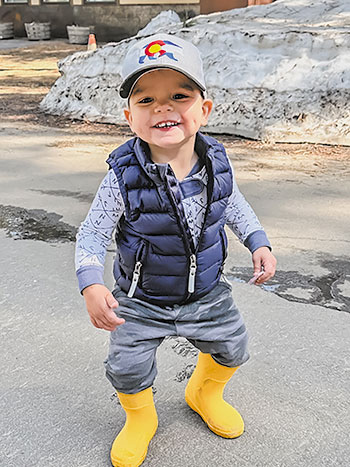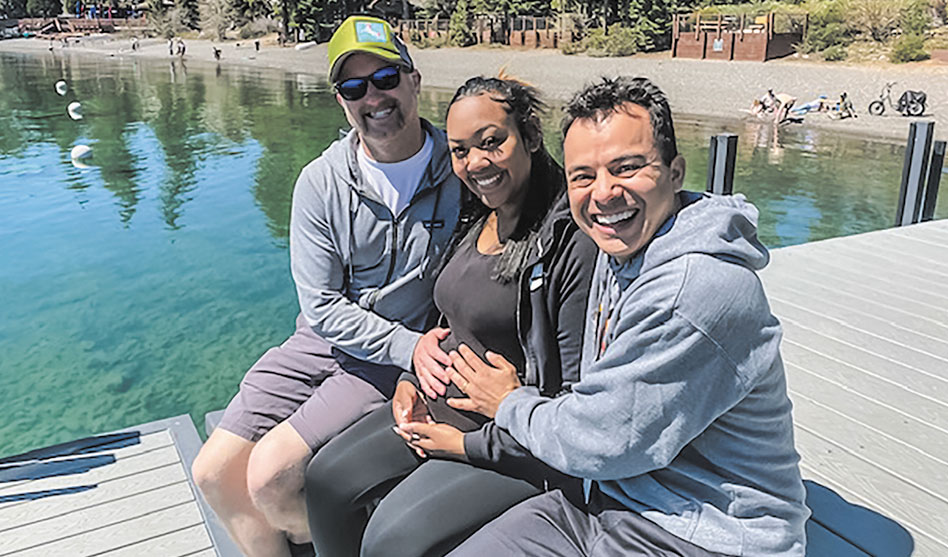Randall and Daryl with their surrogate, Zarah
A court ruling and new legislation give embryos personhood and threaten IVF
DAVID TAFFET | Senior Staff Writer
taffet@dallasvoice.com
Randall and Daryl, who have been together 15 years, said they talked about having children on their first date. Zarah, their surrogate, said she’s proud of helping them grow their family.
Surrogacy has become a common route to parenthood.
But a recent Alabama Supreme Court decision recognizing frozen embryos as people, with possible liability and penalties for the destruction of those frozen embryos — has sent shockwaves through the in vitro fertilization or IVF community. SurrogateFirst, a surrogacy agency, completed a survey soon after the Alabama ruling.
Of intended parents surveyed, 98 percent reported concerns over new legislation that will hinder their family-building efforts. Of those, 67 percent of same-sex couples intending to use IVF are more concerned they’ll be targeted. And 55 percent of surrogates “are deeply troubled by legislative effects on IVF.”
Among those surveyed, 20 percent report postponing surrogacy and half report increased costs already.
Four states — Alabama, Arizona, Georgia and Missouri — have enacted laws “granting personhood rights” to embryos. The law was blocked from taking effect in Arizona.

Caleb
Twelve more states have introduced legislation. Texas isn’t among them, but only because the legislature didn’t meet this year. Expect to hear more out of Austin on the issue next session in January 2025, although Gov. Greg Abbott earlier this year declared his support for IVF and Texas’ junior U.S. senator, Ted Cruz, filed a bill in Congress to protect IVF.
One family’s journey
Randall and Daryl explained the steps they went through to conceive their son and how these new laws may affect surrogacy.
Before a surrogate was chosen, the couple chose an egg donor. Fourteen donated eggs were fertilized with sperm from the two men. Three developed into viable embryos.
Two women are involved in the IVF process — an egg donor and a surrogate. An egg donor’s eggs are fertilized and implanted into a different woman acting as the surrogate. That prevents the surrogate, who carries the child to term, from claiming to be the child’s biological parent and from having parental rights.
Once the couple chose Zarah as their surrogate, one of the embryos was successfully implanted in her. Had pregnancy not been achieved, another embryo would have been unfrozen, and they would have tried again.
But because Zarah became pregnant on the first try, the two remaining embryos have been kept frozen. And now, according to the Alabama court ruling and new laws proposed in states such as New York, Massachusetts and Illinois, those embryos are people and cannot be destroyed — even if the parents have no intention of having more children.
Among surrogates surveyed by SurrogateFirst, 54 percent said the new laws had no impact on their determination to help others start a family. In fact, 36 percent said the legislation only increased their motivation to be a surrogate.
Randall and Daryl are glad they went through their surrogacy several years ago. Zarah, who said being a surrogate was something she has wanted to do since she was a teenager, is considering becoming a surrogate again for another couple.
“It started when I had a 7th grade teacher who was a surrogate herself,” she said, explaining that she had asked her teacher questions and learned she had met, through an agency, a couple who couldn’t have a baby themselves.
Once Randall and Daryl had viable embryos, they found Zarah through their agency. One embryo was unfrozen and implanted, and two years ago Caleb was born.
And while some parents don’t keep in touch with their surrogates or only send, at best, infrequent updates, “We do FaceTime [with Zarah] once or twice a month,” the two men said.
“I feel love in my heart when I hear from them,” Zarah added. “I’m appreciative of the relationship I have with them.”
The couple and their surrogate live in different states, but the two men will be visiting Zarah this summer, which is the happy end to a long process that began when the men attended a Men Having Babies conference in San Francisco. After the San Francisco conference, the two men talked to several agencies and chose the one that they were most comfortable with.
They and Zarah agree that making the right connection is key to a successful surrogacy.
Zarah described how they met as being like online dating. She created a profile, and, once the couple chose her, she got to read their profile.
“I liked everything about them,” she said. “They had a dog. Love mountains. We developed a strong connection. A mutual connection.”
Zarah said she loves telling people about her experience but the question she’s often asked is, “How did it feel giving away your baby?”
But, she said, “That’s not how it works.”
“That adds to how special you are, Zarah, helping bring life into this world for another couple,” Randall said.
“You’re pretty damn special,” Daryl agreed.
Zarah said her relationship and friendship with the two men was just beginning.
“I’m super excited to see where it goes,” she said.

